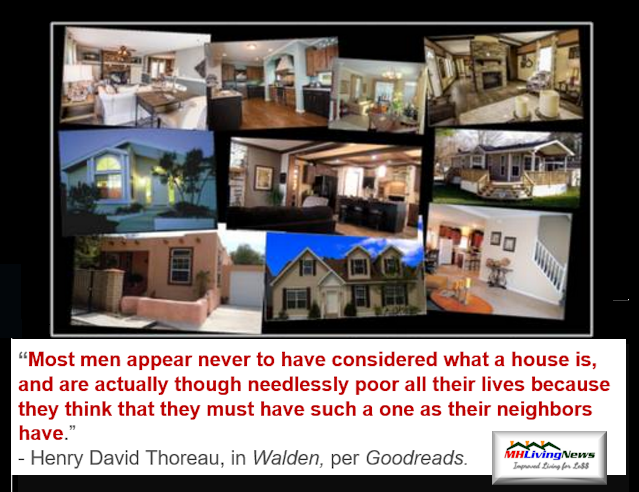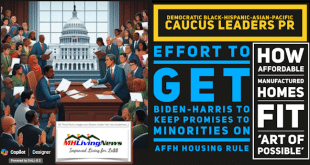In just over three weeks, this video below entitled “Seattle is Dying” by KOMO, a local ABC TV affiliate there, has broken 2.1 million views. It is an hour-long and compelling documentary that ends with hope based upon some promising solutions. But it first lays out one troubling fact and example after another.
Misplaced compassion is part of their city’s story, but there is more to it.

The next and much shorter video from Eugene, Oregon lays out that they are seeing the early signs of the same troubling trends that “Seattle is Dying” laid out. Eugene’s city leaders want to avoid that, of course. The need for affordable housing is part of the mix of issues in both Seattle and Eugene. But that need for affordable housing is a national need, and those two cities are just examples to make a broader point.

Manufactured homes are an obvious solution to that need. The video with a local public official below with extensive first-hand experience with manufactured homes demonstrates that not all jurisdictions resist manufactured housing.
Seattle is struggling now to protect their remaining manufactured home communities, often mislabeled as ‘mobile home parks.’ But do they now fully grasp the possible causes and effects of allowing affordable manufactured homes to disappear?
Federally regulated manufactured homes – or even pre-HUD Code mobile homes – are both wildly misunderstood. Our MHLivingNews report on “Fear” and Manufactured Homes – or the Value Penguin report on a related topic linked below – stand as reminders that for years, this site has said that the solution to affordable housing is hiding in plain sight.

But when a solution is surpassed, abused, or ignored, the unintended consequences of homelessness, drug abuse, and crime occurring in Seattle, Eugene or elsewhere may raise their ugly heads.
When a city like Bryan, TX takes another step toward limiting or banning manufactured homes, they are arguably setting themselves up to become a future death-spiral city like Seattle. Compare those tents or cardboard box camps to a sampling of the styles of manufactured homes shown below, and the insanity of limiting manufactured housing becomes stark.

Tents or Cardboard Boxes with Homeless vs. Affordable Manufactured Homes?
They case can be made that when manufactured homes are not protected and embraced, what will follow is tents, cars, and cardboard boxes for the homeless who can’t afford conventional housing. The despair on the streets leads to a vicious cycle of illegal drugs, substance abuse, and crimes.


The federal government has a simple role to play, and it has sadly not been accomplished by either Democratic or Republican Administrations to this point. It’s this. Enforce the law on federal preemption for manufactured homes. Don’t allow a city become a basket case – as is sadly occurring in Seattle – by limiting access to federally regulated and protected manufactured homes.
In the previous article accessed by clicking the text image box below, we see that affordable manufactured homes – property understood – are embraced by Democrats and Republicans alike. Affordable housing is a non-partisan issue that can bring people of all backgrounds together, when facts and common sense are applied.
They should be. What was going wrong with parts of the mobile home industry in the late 1960s was fixed by the passage of federal regulations that went into effect on June 15, 1976. Those laws created modern manufactured homes that are regulated for construction, energy, and safety standards.
Those safety and construction standards work, as independent research has proven time and again.
So, what has gone so wrong that manufactured homes are so misunderstood today? It could be summed up like this.
- There is widespread misunderstanding, which ignorance of terminology, why it is important, or other product safety and durability details demonstrates.
- The misunderstandings – when juxtaposed to third-party research – reveals that manufactured homes are an amazingly appealing and proven solution for affordable housing. There is no more proven solution available in America today.
- The Manufactured Housing Institute (MHI), for whatever reasons one may care to speculate, has obviously failed to clear up that misinformation.
- MHI is dominated by Berkshire Hathaway owned brands companies, such as Clayton Homes, 21st Mortgage, Vanderbilt Mortgage and Finance (VMF), and several others.
- A report linked here documented actions taken by Berkshire owned brands arguably led to the closure of thousands of independent manufactured home retailers. That in turn disrupted the rest of the production, finance, supplier, installer, communities, insurance, investing, and others who provide professional services to the industry.
- That in turn hurt real people. See that publicly unchallenged documented report, linked once more right here. We’ve invited Clayton, 21st, and MHI to disprove or explain away any of those linked concerns, and to date they have routinely declined.
Market manipulation is one way to describe what the evidence points to that arguably caused thousands to lose their businesses. “Restraint of trade,” “collusion” and other related terms are linked to causes of possible action for antitrust cases, that can be either federal and/or civil.
The remaining businesses in manufactured housing are slowly being “consolidated” into the hands of a few multi-billion dollar brands.
We editorially have no problem with money honestly earned. We do have a problem with rigged systems and manipulated markets, because that sort of behavior is unethical and is rightfully seen as being possibly illegal.
By allowing the industry to be artificially depressed, the manufactured housing market has been slowly eaten up by larger players who by accident and/or design benefited from Berkshire Hathaway brands market manipulation. Are there others who see this issue similarly, or are the publishers of Manufactured Home Living News or MHProNews alone in this viewpoint?
Let’s consider this partial list of other publishers who have dealt with aspects of this troubling concern.
- The Atlantic,
- the Nation,
- Center for Public Integrity,
- The Seattle Times,
- GuruFocus,
- BuzzFeed News,
- Austin Frerick with the Open Markets Institute,
- and others have documented aspects of this problem. So MHLivingNews and our professional sister site MHProNews are far from alone. Note that in listing the links above, we don’t imply that we agree with their every nuance, interpretation, or proposal. But the facts are what they are. That list establishes that there are concerns from a variety of media, not only our industry leading manufactured home trade media.
To date, only our sites have to date documented how this market manipulation was specifically accomplished, and that was done by using the Berkshire brands own statements and records. 21st, as the document found at the link here, cut off lending to thousands of independents. That gave Clayton and their related Berkshire brands a path to increased market share at a bargain price. That move is arguably a violation of federal antitrust laws. That tragic set of actions occurred during a Democratic administration, but it has not yet been remedied by a Republican occupied White House.
No one in mainstream or trade media has spent more time pealing back the layers on how that move by the Berkshire brands then – and other since then – has impacted consumers, workers, businesses, and taxpayers than MHLivingNews and MHProNews.
How this Connects to Why Seattle is Dying
Why are Seattle and other cities dying? We can go through a litany of social, economic, faith, and other causes and contributing factors.
But in that mix is the need to enforce existing laws. Cities ought not block affordable housing, which is federally protected. When they do so, it becomes part of a municipalities death spiral. The federal government ought to forbid cities, towns, counties, or states to interfering with the proper “enhanced preemption” established by the Manufactured Housing Improvement Act of 2000.
There also should be an enforcement of the principle of Affirmatively Affirming Fair Housing. The rest are details, important ones, but nevertheless the particulars.
Public officials and housing advocates need to take a fresh look at the connections between affordable manufactured homes and a healthier society. A healthier society is also – per third party research – a more economically productive society that benefits workers, independent businesses, and thus the tax base too.
It could all be boiled down to a stark choice between people living on sidewalks, parks, cars, tents, or cardboard boxes vs. living in a federally regulated manufactured home that are properly sited and installed. Those manufactured homes should be protected and embraced, as Seattle is perhaps only beginning to learn late in the game.

Governments and advocates at all levels need to look at how market manipulation has arguably contributed to this death-spiral in places like Seattle.
Housing shoppers need to consider that many manufactured home owners first owned a conventional house, and that they routinely love their more affordable home.
Last but not least, owners of manufactured homes must take pride in their homes. Indeed, most do. They should not allow their lifestyle to be diminished or detracted by misguided agenda-driven people, however well-meaning they may be. Indeed, third-party surveys reflect that most manufactured homeowners love their homes. See the related reports, below the byline and notices for more.
Let’s close by noting that we are not condemning everyone that works at Clayton, 21st or that may be associated with MHI. We are denouncing specific behavior based on evidence that suggests it was committed by a limited circle of individuals. We at MHLivingNews believe in a wheat and chaff approach that makes proper distinctions as to what is good – like wheat – and what should be rejected or discarded – like chaff.
But there is clear evidence, that leadership voices in the Omaha-Knoxville-Arlington axis of Berkshire Hathaway-Clayton Homes-MHI has failed to disprove, or even attempted to dispute when they have repeatedly been invited by us and others to do so.
The evidence and testimony routinely suggests a few are benefiting, while millions are paying the tragic price for an arguably rigged system.
There is more to say, but much of that are found in the videos, details, and commentary already published in other reports and videos found on this website. “Improved Living For Less” © is more than a slogan, it has serious meaning, as Seattle and others cities are tragically discovering. “We Provide, You Decide.” © ## (Lifestyle news, commentary, and analysis.)
(Third-party images and citations are provided under fair use guidelines.)

Soheyla Kovach co-founder of MHLivingNews, on left,
with son Tamas (pronounced like Tah Mash), and publisher L. A. ‘Tony’ Kovach, on the right.
Related Reports:
Celebrities, Millionaires, Billionaires and Their Appealing Manufactured Homes
The “Need For Quality Affordable Housing Has Never Been Greater,” Says LT
Foremost Report: Manufactured Home Customer Survey and Market Facts
 manufacturedhomelivingnews.com Manufactured Home Living News
manufacturedhomelivingnews.com Manufactured Home Living News



































